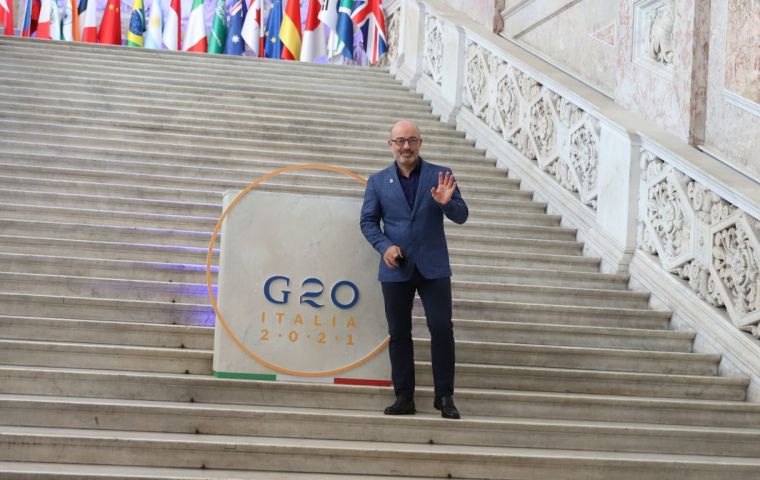MercoPress. South Atlantic News Agency
G20 environment meeting opens with ambitious joint document
 Cingolani warned against “green dumping” - less expensive products manufactured with no regard for the environment
Cingolani warned against “green dumping” - less expensive products manufactured with no regard for the environment G20 environment and energy ministers Thursday held their first day of meetings in the Italian city of Naples, after which they issued a joint document on the protection of nature, especially ecosystems.
This document implies the protection of ecosystems and biodiversity, as well as circular economy and green finance, according to Italy's Minister of Ecological Transition Roberto Cingolani.
But profound differences among G20 countries remains. There are the United States and Europe, rich and technologically advanced, who push towards renewable energies against fossil fuels. But, on the other hand, emerging nations such as China and India, or those based on hydrocarbons like Russia and Saudi Arabia, oppose those changes.
“Everyone agrees with the decarbonization goals, but not everyone agrees with the timing and the ways to reach” that goal, Cingolani explained.
Thursday's document “is particularly ambitious and identifies 10 lines of action that reflect the vision of the Italian plan: natural solutions for the climate, fight against soil degradation, food security, sustainable use. of water, protection of oceans, fight against plastic in the sea,” Cingolani added, as he also underlined that post-pandemic funds represent an excellent opportunity to “imagine new and better ways of organizing our societies.”
Cingolani insisted that “we must increase the contributions for decarbonization to developing countries. The Paris Agreement has a fund of 100 million dollars, but we only reached 60.”
“It is not only a question of money but also of technology transfer. Some players can use certain technologies for free for a certain time,” he went on.
The Italian official drew the spotlight towards “green dumping,” which would mean that although Europe can produce under sustainable conditions, it would still need to compete with less-expensive products from countries that do not meet environmental standards.
“Europe makes huge investments to decarbonize, but it produces only 9% of Co2. It has excellent leadership in the effort, but it is not enough. If other countries do not join us, their emissions compensate for our cuts [and] the system falls apart.”
Thursday's agenda was focused on biodiversity and the natural environment, while energy and climate change will be discussed Friday.
The seven-page document signed Thursday covers numerous topics, such as food security, sustainable water use, marine debris, sustainable finance and how to better educate young people on climate issues, Cingolani told reporters.




Top Comments
Disclaimer & comment rulesCommenting for this story is now closed.
If you have a Facebook account, become a fan and comment on our Facebook Page!